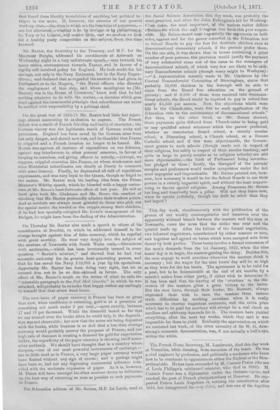The Education address of Mr. Baiues, M.P. for Leeds, read
at
the Social Science Association this day week, was probably the most practical, and after Sir John Pakington's bid for Working- Class votes, the roost important,, of the various rather diffuse effeeitina for which the said Congress has been this year respon- sible. Ms. Baines stated most iiapientially the rerguments on both sides, against and for the power- accordedi in the Education Act to School Boards to pay the fees for destitute children oven at denominational elementary schools, if the parents prefer them. Oa the one side, it was shown that in towns containing a great number of poor persons, this provision would justify the payment of very substantial sums out of the rates to the managers of denominational schools, of which very few are likely to he ordi- nary Nonconformist schools (though many might be Wesleyan): —" A representation recently made to Mr. Gladstone by the Central Nonconformist Committee of Birmingham, states that probably 10,000 children in the borough will be able to claim from the Board free education on the ground of poverty ; and if 8,000 of these were received into denomina- tional schools, the Board would be required to pay in school fees nearly £4,500 per annum. Now, the objections which were felt to the Church-rate, were felt to such application of the Education rate to the maintenance of denominational schools." But then, on the other hand, as Mr. Baines showed, these payments quite differed from Church-rates in being paid to any qualified school whatever 'which the parent preferred, whether an unsectarian Board school, a strictly secular school, a Dissenting school, a Church school, or a Roman Catholic school, and if this were objectionable, the Govern- ment grants to such schools (though made not in respect of their religious, but solely in respect of their secular teaching, and quite as large to purely secular as to religious schools) are still more objectionable,—the faith of Parliament being neverthe- less pledged to them ; finally, the disregard of the parents' scruples and preferences-would render compulsion under the Act most unpopular and impracticable. Mr. Baines pointed out, how- ever, how necessary it would be for the School Boards to use their powers in a strictly impartial spirit, and without the least malacca- vring to favour special religions. Among Dissenters Mr. Baines has long and deservedly been a pillar. Will not they listen now, when he speaks judicially, though his drift be other than they had hoped ?


































 Previous page
Previous page